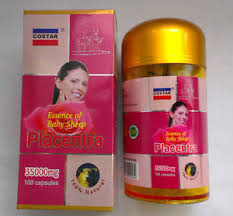No seriously, people eat placentas. The narrative was eating this should be good for your health. I have no idea who thinks of such things, and who, after giving birth would look at that pile of goo and think “with a bit of ketchup…” I suppose these are the same people who sell or buy breast milk online (see my post Breast Milk for Sale: Five Reasons this is Bad).
But apparently this is common enough that someone made up a word, “placentophagy” (the word placenta and phagy to feed upon). The narrative of this phagy are that eating placenta will reduce pain after delivery, help with energy levels, increase breast milk production, and enhance bonding. For those who want to add more science-sounding words to this practice, they will note that placentas must be rich in nutrients since they are feeding the child, and it must be rich in hormones – since a growing body needs hormones (I wonder if they ever thought the hormones for the child might not be good for the adult?).
So a group out of Northwestern published their review of this practice and found the following:
(a) There is no evidence it reduced pain in humans – at least evidence from a reliable study
(b) Studies about facilitating contractions, resumption of normal cycles, and milk production are inconclusive
(c) And while lots of animals do this after giving birth, it does not seem to have a human reason
Apparently you can get this in pills. You can also have a service do a “placental encapsulation” for you. Yes- there are a lot of ways you can consume the placenta – however, there is no perceived benefit and the harm – you ask, might be that this may contain bacteria and viruses.
There are real medications that provide all those benefits – and studies to back them up.
In terms of the placenta in time: ancient societies thought it might be a twin, or had a soul, or buried it. They didn’t have much understanding- and there was more superstition than reality. While many mammals will eat the placenta – a teleological explanation has more to do with getting some nutrition than it does with some “biotruth” of the benefit of eating placenta.
As much as I love culinary medicine – placenta should not be on the menu.
References:
Placentophagy: therapeutic miracle or myth? Cynthia W. Coyle, Kathryn E. Hulse, Katherine L. Wisner, Kara E. Driscoll, Crystal T. Clark Archives of Women’s Mental Health
June 2015. PMID: 26043976

